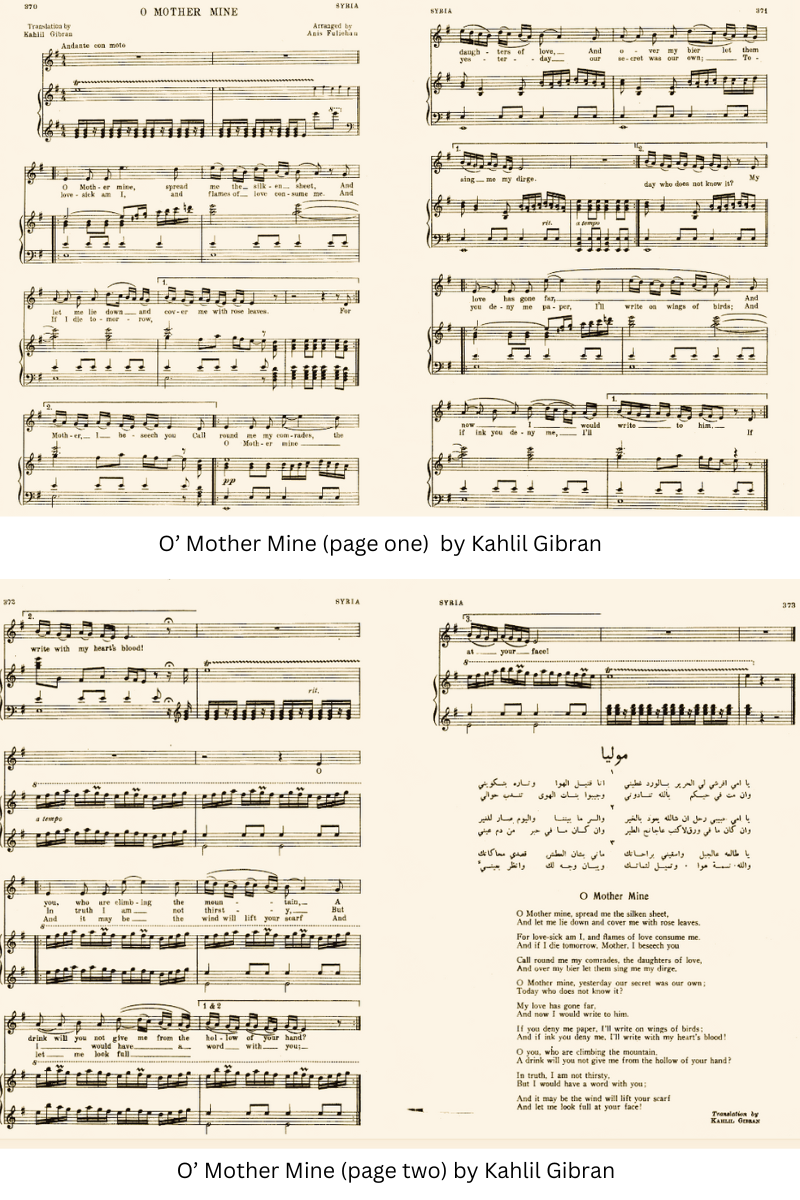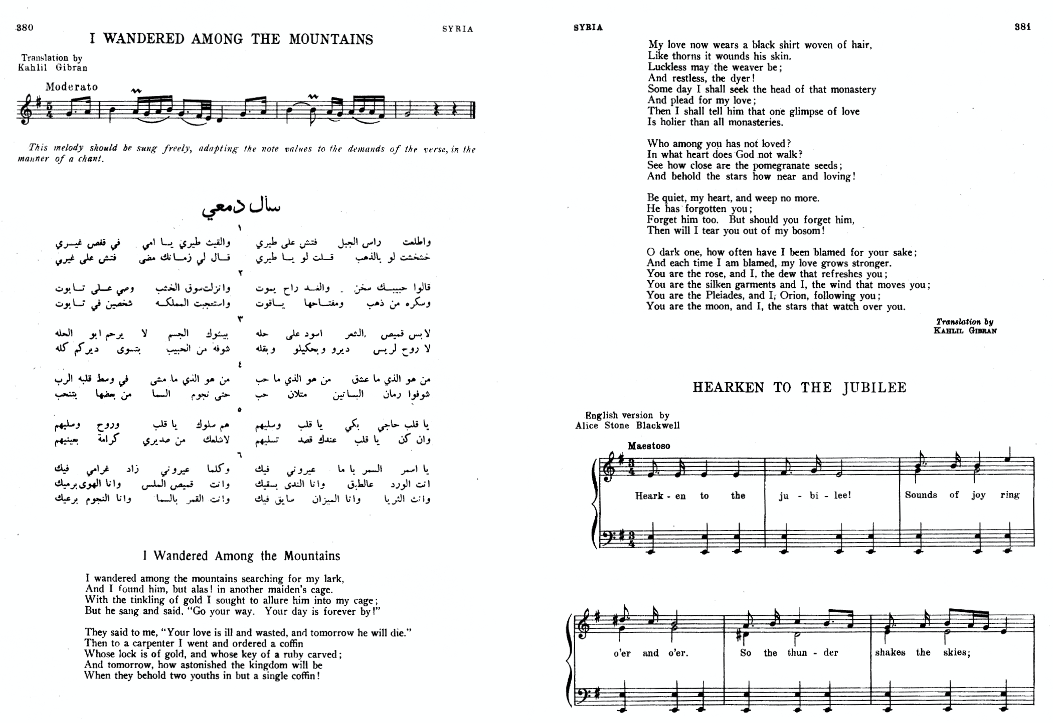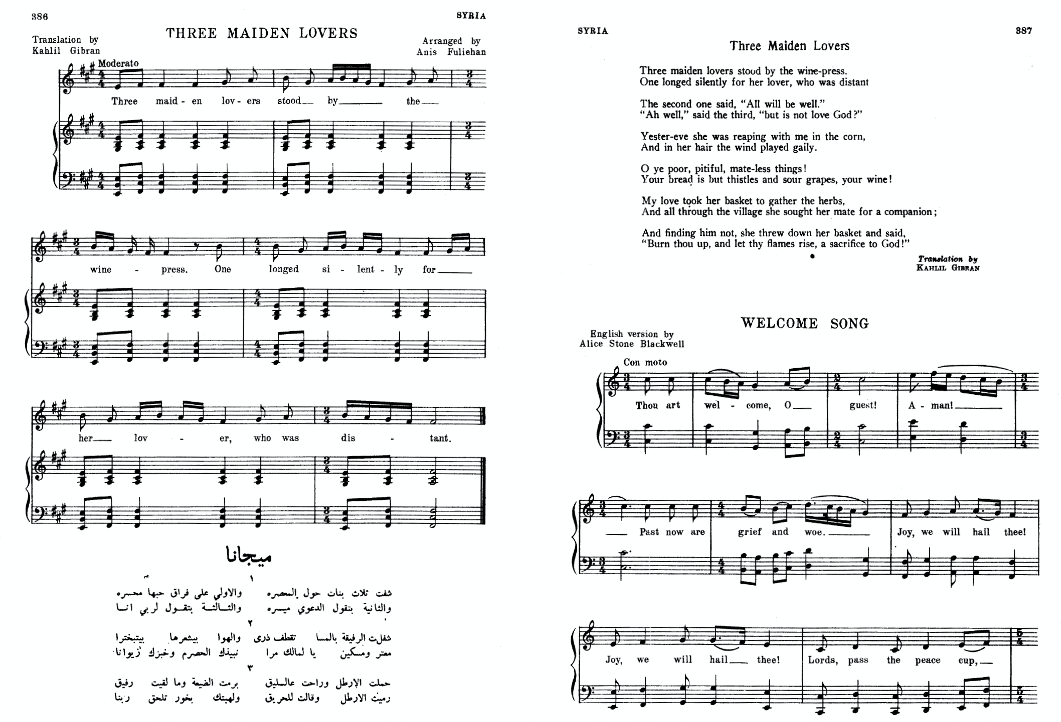-
-
-
-
Search
-
-
0
-
Shopping Cart
xProducts:0Cart Empty
-
By Francesco Medici
all rights reserved. Copyright © 2025
The book in two volumes, Folk Songs of Many Peoples with English Versions by American Poets, published in New York in 1922, in its section dedicated to Syria, includes six texts translated from the original Arabic into English, three of which by Ameen Rihani (Amīn Fāris al-Rīḥānī, 1876-1940), and the other three by Kahlil Gibran (Ǧubrān Ḫalīl Ǧubrān, 1883-1931). Musical scores and the original texts are provided with the translations of the Syrian/Lebanese folk songs, arranged by the Cypriot-born American composer, conductor, pianist of Lebanese origin Anis Fuleihan (Anīs Fulayḥān, 1900-1970).
The songs translated by Rihani are al-Dabkah, with the title Across The Bridge, O Come, Taftā Hindī (Indian Taffeta), and Marmar Zamānī, with the title My Day is Bitter. Those translated by Gibran are Mūlayyā, with the title O Mother Mine, Sāla dam‘aī, with the title I Wandered Among the Mountains, and Mīǧānā, with the title Three Maiden Lovers. 1 All these six translations were individually republished five years after in «The Syrian World». 2
Here below are the transcriptions of the three Gibran’s texts.
O Mother Mine (Moulaya)
O mother mine, spread me the silken sheet,
And let me lie down and cover me with roses leaves.
For love-sick am I and flames of love consume me.
And if I die tomorrow, Mother, I beseech you
Call round me my comrades, the daughters of love,
And over my bier let them sing me my dirge.
O mother mine, yesterday our secret was our own;
Today who does not know it?
My love has gone afar,
And now I would write to him.
If you deny me paper, I’ll write on wings of birds;
And if ink you deny me, I’ll write with my heart’s blood!
O you, who are climbing the mountain,
A drink will you not give me from the hollow of your hand?
In truth, I am not thirsty,
But I would have a word with you;
And it may be the wind will lift your scarf
And let me look full at your face!

I Wandered Among the Mountains
I wandered among the mountains searching for my lark,
And I found him, but alas! In another maiden’s cage.
With the tinkling of gold I sought to lure him into my cage;
But she sang and said, ‘Go your way. Your day is forever by’.
They said to me, ‘Your love is ill and wasted, and tomorrow he will die’.
Then to a carpenter I went and ordered a coffin
Whose lock is of gold and whose key of a ruby carved;
And tomorrow, how astonished the kingdom will be
When they behold two youths in but a single coffin!
My love now wears a black shirt woven of hair.
Like thorns it wounds his skin
Luckless may the weaver be;
And restless, the dyer!
Some day I shall seek the head of the monastery
And plead for my love;
Then I shall tell him that one glimpse of love
Is holier than all monasteries.
Who among you has not loved?
In what heart does God not walk?
See how close are the pomegranate seeds;
And behold the stars how near and loving!
Be quiet, my heart and weep no more.
He has forgotten you;
Forget him, too. But should you forget him,
Then will I tear you out of my bosom!
O dark one, how often have I been blamed for your sake;
And each time I am blamed, my love grows stronger.
You are the rose and I, the dew that refreshes you;
You are the silken garments and I, the wind that moves you;
You are the Pleiades and I Orion, following you;
You are the moon and I, the stars that watch over you.

Three Maiden Lovers
Three maiden lovers stood by the wine-press.
One longed silently for her love, who was distant.
The second one said, ‘All will be well’.
‘Ah, well’, said the third, ‘but is not love God?’.
Yester-eve she was reaping with me in the corn,
And in her hair the wind played gaily.
O ye poor, pitiful mate-less things!
Your bread is but thistles and sour grapes, your wine!
My love took her basket to gather the herbs,
And all through the village she sought her mate for a companion;
And finding him not, she threw down her basket and said,
‘Burn thou up and let they flame rise, a sacrifice to God!’.

[1] Folk Songs of Many Peoples with English Versions by American Poets, compiled and edited by Florence Hudson Botsford, Vol. II, New York: The Womans Press, 1922, pp. 368-381, 386-387. As for Rihani’s translations, cf. Waves of My Life and Other Poems, pp. 133-137; as for Gibran’s once, cf. The Essential Gibran, Compiled and with an Introduction by Suheil Bushrui, Oxford: Oneworld, 2007, pp. 103-105.
[1] Ameen Rihani, My Day is Bitter (Marmar Zamani), «The Syrian World», I, 10, April 1927, p. 17; Across the Bridge O Come (Translation), «The Syrian World», II, 1, July 1927, p. 13; Tafta Hindi (Translation), «The Syrian World», II, 3, Sept 1927, p. 10; Kahlil Gibran, O Mother Mine (Moulaya), «The Syrian World», I, 9, March 1927, p. 13; I Wandered Among the Mountains, «The Syrian World», I, 11, May 1927, p. 11; Three Maiden Lovers, «The Syrian World», II, 2, August 1927, p. 13.
* This article is based on an excerpt from the paper: Francesco Medici, ‘Muhāǧirūn wa Mutarǧimūn: Early Arab Authors of the Diaspora as Translators and Self-Translators’, «Letters from Byblos», No. 28, Byblos: 2024, pp. 13-57.